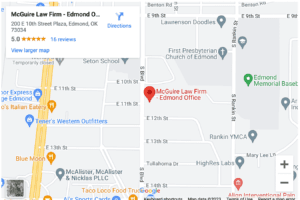No-Fault vs. At-Fault Insurance

Insurance laws vary by state. State laws can require drivers to have fault and no-fault insurance coverage. Most states are fault-based insurance states for car accidents.
In an at-fault state, you must prove the legal elements of a negligence claim to recover compensation for damages from the driver who caused the car accident. Oklahoma is an at-fault state for car accident claims.
How Does No-Fault Insurance Work?

In a no-fault insurance state, drivers generally must have Med Pay or Personal Injury Property (PIP) coverage. Both types of car insurance pay benefits to the insured and cover individuals regardless of who caused the accident.
Therefore, if you are involved in a car crash in those states, you file an insurance claim with your no-fault insurance company. Med Pay and PIP insurance would pay for your medical bills and other damages, even if you caused the accident.
However, no-fault insurance does not compensate you for all damages caused by a traffic accident. In addition, it may not cover all medical expenses you incur because of the car wreck.
Many no-fault states have “injury thresholds” for car accident claims. If you sustain severe injuries in a car accident, you can sue the at-fault party for damages. If the driver has liability auto insurance, you can file a claim with the insurance provider.
Oklahoma’s Fault Insurance System for Car Accidents
Drivers in Oklahoma are required to carry minimum amounts of liability insurance. Liability insurance pays for damages sustained in an accident that you cause.
Oklahoma requires drivers to have a minimum of:
- $25,000 bodily injury liability insurance per person
- $50,000 bodily injury liability insurance per accident
- $25,000 property damage insurance
If the accident were the other driver’s fault, you would file a claim with the other driver’s insurance provider. The insurance company investigates the claim to determine if its insured is responsible for causing the accident. The insurance company is liable for damages up to the policy limits.
Unfortunately, $25,000 may not cover all the damages caused by a car accident. If the driver does not have higher policy limits, you have a couple of options.
You can file a lawsuit against the at-fault driver seeking a personal judgment for damages. You can also file an underinsured motorist (UIM) claim if you have UIM coverage.
Your UIM insurance pays the difference between the amount your receive from the at-fault driver and the total of your damages. Your insurance provider “stands in the place of” the at-fault driver.
What Do I Need to Prove to Recover Compensation for a Car Accident in Oklahoma City?
Because Oklahoma is an at-fault state, you must prove the elements of negligence to recover money for your injuries and damages. The elements of negligence are:
- The other motorist owed you a duty of care
- The motorist breached the duty of care
- The breach of duty was the reason for the car crash
- You sustained damages because of the breach of duty
Everyone who operates a motor vehicle has a duty of care to follow traffic laws. They also have a duty to use reasonable care to avoid collisions.
Most car accidents are avoidable. The breach of duty arises when the driver makes an error or engages in dangerous driving behavior. Examples of causes of car crashes that could result in a breach of duty include, but are not limited to:
- Distracted driving
- Speeding
- Drowsy driving
- Impaired driving
- Reckless driving
- Failing to follow traffic laws
Once you prove causation and fault for the car crash, you can demand compensation for your damages. However, proving negligence requires evidence. Even if you have evidence of fault, the insurance company might not negotiate a settlement in good faith.
The primary reasons insurance companies fight claims are disputes related to liability and damages.
What Damages Can I Recover for a Car Accident Claim in Oklahoma City?
Drivers responsible for causing car crashes in Oklahoma can be held liable for economic damages, such as:
- Medical bills
- Long-term nursing care
- Out-of-pocket expenses
- Past and future lost wages
- Decreases in earning potential
Victims may also recover compensation for their non-economic damages. These damages include permanent impairments, emotional distress, loss of enjoyment of life, mental anguish, and physical pain and suffering.
In a few cases, the plaintiff may receive punitive damages. However, you must prove that the other driver is guilty of intentional or willful and reckless behavior. Awards of punitive damages are rare because it is a higher burden of proof to prove the defendant should be punished for their behavior.
Schedule a Free Consultation With Our Oklahoma City Personal Injury Lawyers
Insurance companies work hard to pay as little as possible to settle your car accident claim. Our legal team fights to get you the money you deserve for an injury claim. Call our law office to schedule a free consultation with an experienced Oklahoma City car accident lawyer.

